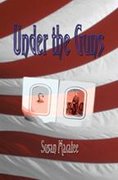"A fictional work (mainly novels) set before the middle of the last century, and
ones in which the author is writing from research rather than personal
experience. This usually means that the novels will take place before the
author's life and times.'" [Sarah L. Johnson Historical Fiction: A Guide to
the Genre].
It then goes on to describe Wallace Stegner's Angle of Repose and the controversy: "Because Stegner based this work on the real life of Mary Hallock Foote issues of artistic license have been raised."
Mary Hallock Foote's letters were later published as A Victorian Gentlewoman in the Far West.
Paranoia - that one sentence makes me think (unreasonably) that I should never use a real person in a fictional work. And let me tell you, it's way too late now! I have no intention of taking out Queen Victoria from Birthrite, nor do I plan on rearranging the 3rd book in that series to take out the Khedives of Egypt and Sudan, specifically Tewfik. Just because they're not integral to the story doesn't mean I don't want them there for historic reasons.
But back to Stegner's story. It's obviously fiction. He even won the Pulitzer in 1972 for fiction. If even the Pulitzer people recognize it as fiction, then why are these artistic license questions raised?
Because he changed Mary Hallock Foote, to Susan Burling Ward. He never acknowledged that change until Mary's letters were published.
Granted, Stegner should've said this was a fictionalized version of Mary’s story, especially since he used whole passages from her letters. Is that the same as using a speech given by Victoria? It's hard to say, but my answer is no. Now, you can check Victoria's speeches on the internet. In 1971, you couldn't, and had those letters not been published, would anyone have known?
Then again, this is a fictionalized version of the story. Whole letters aside, how much could he really know about the circumstances surrounding Mary’s life and loves from her correspondence alone?
What are your thoughts?









2 comments:
Whether or not it seemed likely that the real letters and the real person who wrote them would ever have become known, the author SHOULD have owned up to what he was doing. There's nothing wrong with taking inspiration from history and the real people who lived it. Trying to pass of their lives as your own invention is crossing the line though.
I found some great fiction book reviews. You can also see those reviews in Historical fiction
Post a Comment